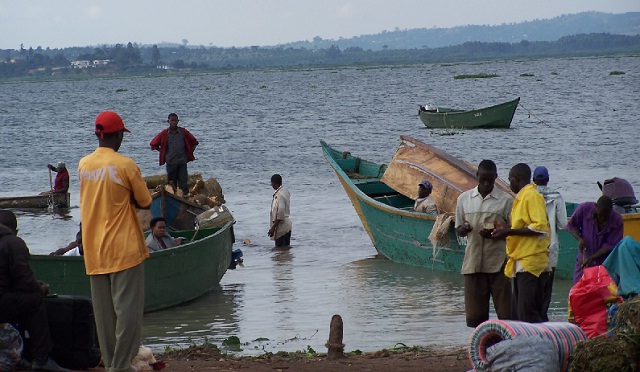Quiet, somber mood at Mutiima beach as relatives and friends wait for news of their loved ones. There are occasional screams and cries when a body is pulled from the water. #Uganda #LakeVictoriaBoatAccident pic.twitter.com/WshWHKavpV
— Catherine Byaruhanga (@cathkemi) November 25, 2018
An official organises possessions washed up at Mutima recovery site on the banks of #LakeVictoria following yesterday’s disaster.
A survivor told police more than 90 people were aboard the vessel.
Police say only 26 people were rescued.
24 bodies hve so far been recovered#Uganda pic.twitter.com/uyjAUq4Hol— Michael O’Hagan (@micoh) November 25, 2018
➡ Biggest Lake on African continent, 70,000 square km
➡ Every year, 3,000 & 5,000 fishermen die
➡ Sept 20, 2018, MV Nyerere sinks, 200+ die
➡ May 21, 1996 MV Bukoba sinks, 800 drown
➡ November 24, 2018 Over 20 drown close to Mutima beach
VIDEO before the accident
After the accident, an eyewitness
Sad stories start pouring in………….
13 bodies confirmed dead, taken to City Mortuary. The operation continues tomorrow. Many feared dead and still in the waters!
— Brig RichardKaremire (@UPDFspokespersn) November 24, 2018
Events Promoter Balaam Barugahara speaks out on the events that unfolded at Lake Victoria after a boat capsized killing 23 people last evening. #NTVNews https://t.co/u3DLRxaeWV pic.twitter.com/WZrhyizSnr
— NTV UGANDA (@ntvuganda) November 25, 2018
I would like to thank all of you who have reached out to me. By GOD’S GRACE I am still Alive ,safe and getting medical attention but so traumatised. My deepest thoughts to our comrades who didn’t make it and condolences to the bereaved families. What can I say? GOD #NSIIMYE ? pic.twitter.com/hH4qbvVYlK
— Iryn Namubiru (@irynnamubiru) November 25, 2018
******
Lake Victoria, a tragic history

Lake Victoria is the biggest lake in Africa and crossed every day by scores of boats that are often poorly maintained and overloaded, making them vulnerable to poor weather.
Here is some background on the vast lake where more than 200 people drowned last month when a ferry capsized.
– Largest in Africa –
With a surface of 70,000 square kilometres (27,000 square miles), oval-shaped Lake Victoria is the biggest on the African continent.
Shared by Tanzania, Uganda and Kenya, it provides the livelihood for some 30 million people, many of them poor and dependent on fishing.
The lake has however seen a dramatic fall in water levels since 2003 and increased pollution.
English explorer John Hanning Speke named it after Britain’s Queen Victoria after he reached it in 1858 during an expedition.
– Regular deadly sinkings –
Many of the ferries, fishing boats and other vessels that cross the vast lake daily, linking its ports and islands, are in poor condition or overloaded.
Navigation can also become as dangerous as on the high seas when the weather deteriorates, with fierce storms often striking.
Sinkings occur regularly and can leave many dead. There are often no life jackets onboard and a large part of the population cannot swim.
Since 2000 there have been a dozen sinkings on the lake with heavy death tolls.
Around 20 people were killed in December 2016 when their boat overturned, and in March 2012, a boat believed to be carrying around 60 people capsized leaving only two survivors.
– 800 drown in 1996 –
The deadliest ever was on May 21, 1996, when a Tanzanian passenger and cargo ferry, the MV Bukoba, went down about nine kilometres (5.5 miles) from the town of Mwanza.
More than 800 people were believed to have drowned, according to a toll released by the Red Cross.
The ferry was unseaworthy and was carrying hundreds more than its capacity of 441 passengers when it sank in 30 metres (100 feet) of water.
– Worsening weather risk –
Every year, between 3,000 and 5,000 fishermen die in violent storms on the lake, Red Cross figures show.
A study published in 2016 in the scientific journal Nature Communications said climate changes caused by global warming could cause more frequent and dangerous storms on the great lake.
Superstorms that today only occur once every 15 years would likely happen every year if global warming continues apace, it said.
 The Independent Uganda: You get the Truth we Pay the Price
The Independent Uganda: You get the Truth we Pay the Price






News is quality